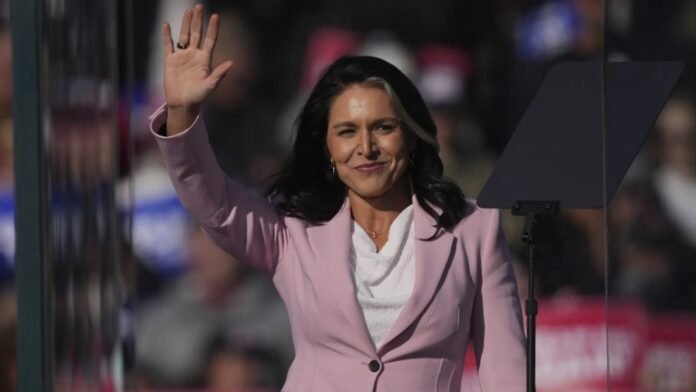Tulsi Gabbard, a prominent Hindu American and former Congresswoman, has been a trailblazer in American politics since her early days as a young legislator from Hawaii. A member of the Democratic Party, Gabbard made headlines as one of the first Hindu members of Congress and has built a reputation for her unique foreign policy stance, outspoken views, and dedication to her spiritual beliefs. Although she has not been appointed by former President Donald Trump as the U.S. Director of National Intelligence (DNI), Gabbard’s outspoken views on U.S. foreign policy and experience in Congress have made her a unique voice in American politics.
Early Life and Background
Tulsi Gabbard was born on April 12, 1981, in American Samoa and raised in Hawaii. Her father, Mike Gabbard, a Hawaii state senator, is of Samoan and European descent, while her mother, Carol, is of European and Hindu descent. Gabbard’s upbringing was marked by her commitment to Hinduism and a love for public service, instilled in her by her parents. At the age of 21, she co-founded an environmental nonprofit organization focused on Hawaii’s natural resources, showcasing her commitment to service from a young age.
Political Journey and Key Achievements
Gabbard’s entry into politics began when she was just 21, becoming the youngest legislator in Hawaii’s history. She served in the Hawaii House of Representatives from 2002 to 2004 before voluntarily deploying to Iraq with the Hawaii Army National Guard. Serving two tours in the Middle East, Gabbard’s experience in Iraq significantly shaped her political views, particularly her positions on foreign policy and U.S. military engagement. Her time in the military earned her the rank of major, adding a unique military perspective to her political platform.
In 2013, she became the first Hindu member of the U.S. Congress when she was elected to represent Hawaii’s 2nd congressional district. During her tenure, Gabbard advocated for various causes, including veteran rights, environmental protection, and non-interventionist foreign policy. She drew bipartisan support for her stances against “regime-change” wars and was one of the few voices in Congress to question the U.S. government’s involvement in Syria and Iraq. Her outspoken foreign policy stances attracted considerable attention, including criticism and praise across the political spectrum.
Presidential Run and Political Influence
In 2020, Gabbard entered the Democratic primary for president, where she sought to bring her anti-interventionist foreign policy to the forefront. Her campaign faced an uphill battle, given her unconventional views and frequent criticism of her own party’s mainstream positions. Despite not winning the nomination, Gabbard’s campaign garnered attention and provided her a platform to promote her perspective on national security and international relations.
Her stance on issues like reducing U.S. involvement in foreign wars and her call to negotiate directly with global adversaries—positions sometimes aligned with Trump-era policies—attracted bipartisan support as well as controversy. Despite her status as a Democrat, Gabbard criticized her party on several fronts, accusing it of pushing a “warmongering” agenda. Her views often set her apart from other Democratic leaders, including her criticism of Hillary Clinton, who she accused of trying to undermine her presidential run.
Gabbard’s Relationship with Trump and Republican Circles
Although Gabbard is a Democrat, she has occasionally aligned with Republican-leaning views, especially in the realm of foreign policy. Her willingness to challenge Democratic stances on issues of war and interventionism has led to speculation that she may be considered for roles by leaders outside her party, including former President Donald Trump. Her stance on certain issues, such as her support for direct engagement with North Korean and Syrian leaders, reflected Trump’s “America First” approach to foreign policy, making her an unusual yet fitting candidate for bipartisan roles.
During Trump’s presidency, Gabbard met with him to discuss foreign policy concerns, sparking rumors that she might be considered for a high-profile appointment, though she was never formally appointed to a position in his administration. Gabbard’s unique political ideology—a blend of Democratic values and anti-interventionist foreign policy—has sometimes brought her closer to Republican figures, sparking rumors about possible future appointments within government roles.
Hindu American Identity and Global Influence
A practicing Hindu, Gabbard has never shied away from her faith, often speaking openly about how it influences her worldview and values. She has used her platform to bridge gaps between the U.S. and India, supporting policies that strengthen U.S.-India relations and defending India’s internal policies, a stance that has gained her a following among Indian-Americans and Hindus globally.
Her Hindu faith and experiences with military service have deeply shaped her approach to leadership and governance. She has publicly highlighted the importance of faith, advocating for peace, unity, and mutual respect among diverse groups. Gabbard’s public embrace of her faith has encouraged greater representation for Hindu Americans in politics and brought awareness of Hindu principles to the American political landscape.
A Politician with a Lasting Impact
Tulsi Gabbard’s legacy is one of challenging political norms and advocating for a pragmatic approach to foreign policy, shaped by her military service and commitment to non-interventionism. As a trailblazer for Hindu Americans and a unique voice within U.S. politics, Gabbard’s career has shown that unconventional perspectives can challenge party lines and influence American policy discourse. While she has not held an intelligence role under Trump’s administration, her influence and appeal remain noteworthy, and her ability to navigate bipartisan spaces could see her involved in significant roles in the future.

